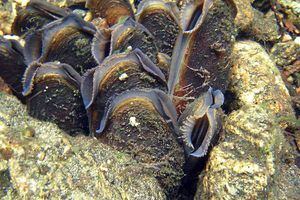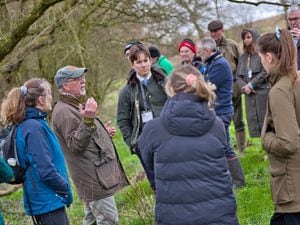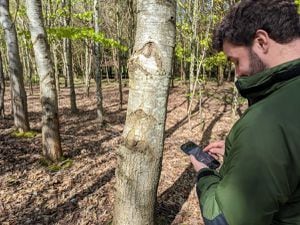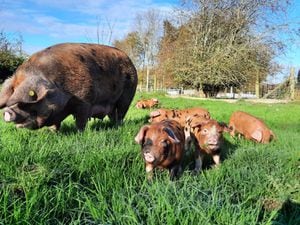£360,000 plan launched in Shropshire to save endangered mussels
A £360,000 project has started to help protect critically endangered pearl mussels in Shropshire.

The project by Shropshire Hills Area Of Natural Beauty Partnership aims to help colonies of the species that were depleted because of habitat changes and inadequate water quality.
The work on the River Clkun will take about four years to complete and includes creating or improving sites to establish habitats.

The freshwater pearl mussel, scientific name Margaritifera margaritifera, is an endangered species of freshwater mussel, an aquatic bivalve mollusc in the family Margaritiferidae.
Although the name "freshwater pearl mussel" is often used for this species, other freshwater mussel species can also create pearls and some can also be used as a source of mother of pearl.
The interior of the shell of Margaritifera margaritifera has thick nacre (the inner mother of pearl layer of the shell). This species is capable of making fine-quality pearls, and was historically exploited in the search for pearls from wild sources.
More than half the world's recruiting population exists in Scotland with populations in more than 50 rivers, mainly in the Highlands, although illegal harvesting has seriously affected their survival.
This species has been fully protected in the United Kingdom under the Wildlife and Countryside Act 1981 since 1998 and partly protected according to section 9(1) since 1991.[/breakout]
The population of freshwater pearl mussel population could die out in the next 20 years, and the Environment Agency and Natural England hope to rescue the endangered molluscs species with a preservation programme on the River Clun.
The last three miles of the river provide one of very few remaining homes for the mussel, which are aged between 60 and 80 and partially bury themselves in fine gravel on the river bed.
The government agencies hope farmers will reduce the levels of nutrients and sediments in watercourses in the area to aid reproduction and stop the tonnes of soil that erode into the river each year from suffocating juvenile mussels.
But the work has concerned farmers in the area who say the project is affecting their work.
The current project follows work that was carried out in 2012 to prevent silt getting into the river which was suffocating the species.
Freshwater mussel populations have declined due to a combination of factors including pearl-fishing, the government's Joint Nature Conservation Committee said
The new project will also repair sites in the river where the mussels can establish habitats.
The partnership said the work would, "provide a refuge for this critically endangered animal".
Wren Biodiversity Action Fund, the Woodland Trust and the Severn Rivers Trust have funded the project.
Project officer Alison Jones, the partnership's project officer, Alison Jones, said: "Besides the obvious wildlife benefits, a healthy river corridor and farm woodland delivers a lot more. Restoring the river habitats will add to green infrastructure."





